New US THAAD defense system arrives in Israel
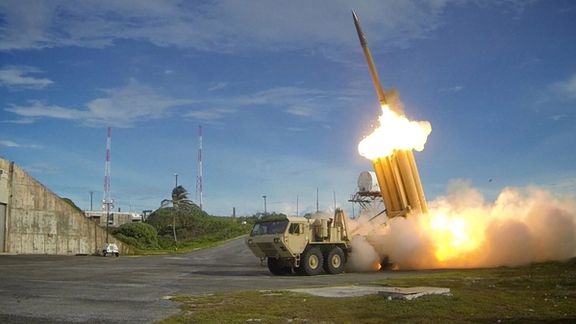
A new US THAAD aerial defense battery has been supplied to Israel amid President Donald Trump's threats of military action against Iran unless it agrees to a nuclear deal.

A new US THAAD aerial defense battery has been supplied to Israel amid President Donald Trump's threats of military action against Iran unless it agrees to a nuclear deal.
An extremely heavy American military cargo plane, a C-5M Super Galaxy, landed at Israel's Nevatim airbase in the south of the country on Saturday.
Flight trackers such as MenchOsint reported that the plane, which is capable of carrying the THAAD air defense systems, stayed at Nevatim for around eight hours.
The first THAAD system was given to Israel in October, in the wake of two attacks from Iran as the once long-time shadow war came to the fore.
The existing THAAD system has been used by Israel in recent weeks to defend against ballistic missiles fired at the Jewish state by Iran's Houthis in Yemen.
An Israeli intelligence source, speaking on condition of anonymity, told Iran International that the THAAD system had indeed arrived this weekend.
The delivery was first reported in the Saudi Arabian Al-Hadath channel and then across Israeli media, though it has not been publicly confirmed by either the US or Israel. Iran International has approached Israel's military for comment.
Last month, Trump told Iran it must reach a nuclear deal or risk being bombed. While the president said he prefers diplomatic means, he said a military solution will be used if Tehran does not cooperate within two months.
Iran's Supreme Leader Ali Khamenei continues to refuse direct negotiations but he and the president, Masoud Pezeshkian, have said the country is open to mediation.
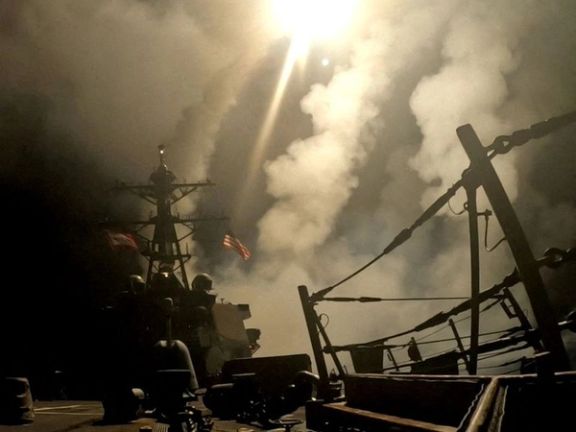
The Yemeni information minister announced that 70 Iran-backed Houthis and members of the Revolutionary Guards (IRGC) were killed in a US airstrike on Tuesday, claims denied by the IRGC, which called it “false news”.
The IRGC affiliated Tasnim News Agency called the Saturday announcement by Muammar Al-Eryani "psychological warfare”. Al-Eryani is the minister of Yemen's official government, which is at war with the Houthis.
"It seems that this false news has been published in the context of psychological warfare and in order to push the region towards an all-out war, while officials and military commanders of the Islamic Republic of Iran have repeatedly announced that the Yemeni Ansarullah forces are fighting the US and Israel completely independently,” Tasnim wrote.
Al-Eryani said in a press statement that the attack targeted a point that was "used to plan terrorist attacks against commercial ships and tankers in the Red Sea, Bab al-Mandab, and the Gulf of Aden” amid the Houthis’ maritime blockade.
The Houthis maintain a narrative of victory when publicizing information on engagement with US military action.
A press statement this week said: "We are in an advanced position on the maritime front, and the American aircraft carrier 'Truman' is in a constant state of retreat, with pursuit ongoing,” the US vessel on the frontline of the maritime conflict.
The US has carried out multiple airstrikes across Houthi-controlled areas of Yemen since last month as it cracks down on the Iran-backed group which has been imposing the blockade since November 2023 in the wake of the Gaza war.
The group began the blockade targeting Israeli-linked ships, claiming to be working in allegiance with Hamas in Gaza but has since targeted multiple international vessels and killed international seamen.
US President Donald Trump has warned that any firing by the Houthis in Yemen will be directly attributed to the Islamic Republic of Iran and will have serious consequences for Tehran.
"From this moment on, every shot fired by the Houthis will be considered a shot fired by Iranian weapons and leadership. Iran will be held responsible, it will bear the consequences, and these consequences will be serious," he wrote in a message on his social media account, Truth Social.
In spite of denials from Tehran that they are controlling the group, Trump continues to attribute blame to Iran for funding and arming the group, the blockade initiated on the orders of Supreme Leader Ali Al Khamenei.
”Let no one be fooled! The hundreds of attacks carried out by the Houthis, these evil thugs and thugs based in Yemen who are hated by the Yemeni people, all originate from and are directed by Iran,” Trump said.
According to the Associated Press this week, satellite images show the deployment of at least six nuclear-capable B-2 Spirit bombers to Camp Thunder Bay on the island of Diego Garcia in the Indian Ocean, which is within striking distance of both Iran and Yemen.
Tensions also remain high between Iran and the US over Tehran’s rapidly advancing nuclear program.
The B-2 would be crucial in potentially bombing Iran’s underground nuclear sites and has been used in combat to target the Houthis in the past.
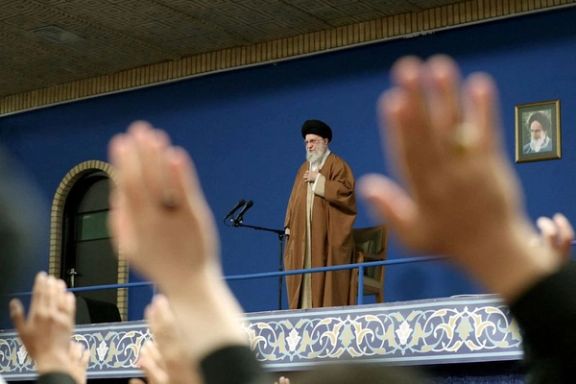
As messaging between Tehran and Washington rapidly evolves, Iranian politicians and media continue to send mixed—and at times irrelevant—signals, while the US stance remains relatively consistent under President Donald Trump, who holds the final say.
His latest remarks on negotiations with Tehran—telling reporters to forget about past letters exchanged with Iran’s Khamenei and suggesting that Iran now seems to favor direct talks—may hint at behind-the-scenes communication between the two sides and possibly some early progress.
An indication of that progress came with the news of President Masoud Pezeshkian telling Saudi Arabia’s Crown Prince Mohammed Bin Salman in a telephone conversation on Friday that "Tehran is prepared to reduce the tensions," and reiterated that "all of Iran’s nuclear activities can be subject to verification."
Meanwhile, the Entekhab website in Tehran quoted “diplomatic sources in Iran” as saying that if the indirect talks in Oman proceed positively, they could be followed by direct negotiations.
Despite a shift in tone from some quarters, harsh rhetoric toward the United States has continued in Iran. Deputy IRGC Commander for Political Affairs Yadollah Javani warned that any attack on Iran’s nuclear facilities—as previously threatened by US officials—would push the country’s nuclear program into a “new phase,” implying potential weaponization. “In that case,” he said, “the West will need to redefine its understanding of Iran and the axis of resistance,” according to Etemad Online.
Javani added that US and Israeli threats would not succeed in destroying Iran’s nuclear knowledge or capabilities and reiterated that nuclear weapons have no place in Iran’s defense doctrine.
His remarks appeared to contrast with those of Supreme Leader Ali Khamenei’s senior adviser, Ali Larijani, who recently said that a military strike could prompt Iran to build nuclear weapons. However, a report on the Rouydad24 website downplayed that aspect of Larijani’s interview with state TV, emphasizing instead his suggestion that there is an opportunity for improved US-Iran trade relations.
The report appeared to frame Larijani’s comments as a pacifist message intended to encourage US investment in Iran. It also quoted Larijani as calling Donald Trump “a very talented man in the area of economy.”
Some Iranians on social media welcomed President Trump’s announcement of a 10% tariff on imports from Iran, framing it as a symbolic gesture of support for the opposition—even though Iran’s exports to the United States are negligible.
In a notably aggressive comment, ultraconservative commentator Mohammad Marandi warned on X that if Iran’s nuclear facilities were attacked, “Iran can destroy Qatar.” His remarks stood in sharp contrast to other hardliners, such as cleric and Majles presidium member Alireza Salimi, who dismissed recent US threats as mere “bluffs,” according to Etemad.
Meanwhile, Chief of Staff of Iran’s Armed Forces, General Mohammad Bagheri, struck a more conciliatory tone. In a video message recorded at the historic ruins of Persepolis, he said Iran seeks friendly relations with all its neighbors—an apparent attempt to reassure the public and ease regional tensions. He was wearing civilian cloths instead of IRGC uniform.
A report in the pro-reform Etemad newspaper said that Iranian lawmakers have drafted two bills related to the country’s nuclear program, with at least one focused on “expanding the peaceful use of nuclear technology.”
Meanwhile, Reformist commentator Abbas Abdi said in an interview with a Tehran-based website that despite President Trump’s threats last week, the United States has not yet made a final decision to launch a military strike against Iran. He added that Iran continues to advance its drone and missile capabilities, now capable of reaching any target in the region.
Another Reformist commentator, Ahmad Zeidabadi, urged figures like Ali Larijani to refrain from discussing the militarization of Iran’s nuclear program, warning that such remarks play into what he described as “a trap set by Israel” to depict Iran as an aggressor.
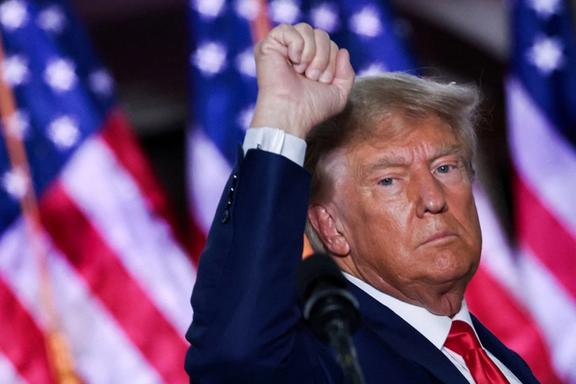
A rhetorical column, written in a satirical tone, in an Iranian newspaper on Saturday called for violent revenge against US President Donald Trump, mocking his threats and invoking the killing of Qasem Soleimani.
The ultra-hardline Kayhan newspaper, published under the supervision of Supreme Leader Ali Khamenei’s office, mocked Trump’s threats of military action should Iran fail to reach a new agreement on nuclear weapons.
Speaking about Trump’s threats and tariffs even against US allies, Kayhan wrote, “He’s way out of line! Any day now, in revenge for the blood of Martyr Soleimani, a few bullets are going to be fired into that empty skull of his and he’ll be drinking from the chalice of a cursed death.”
After President Trump’s threats of a military strike, Tehran has agreed to indirect talks, despite a previous ban by Khamenei. However, Trump has said he prefers direct negotiations.
Kayhan, mocking the US president also wrote, “He makes threats and then backs down! The result? The situation in America gets worse by the day. Just yesterday, it was announced that his actions have caused $3 trillion in damage to the US economy, American exports are facing serious problems, and top officials in the military, CIA, and elsewhere have either resigned or been dismissed…”

Any potential US airstrike would target not only Iran's nuclear facilities but also its air defense and missile capabilities in a bid to prevent possible retaliation, the former commander of US Central Command told Iran International.
The US military has in recent days deployed long-range bombers at a strategic Indian Ocean airbase amid escalation of tensions with Tehran, a move which presaged major bombing campaigns against Afghanistan in 2001 and Iraq in 2003.
In an exclusive interview with Iran International, former CENTCOM commander and CIA chief David Petraeus described the deployment as a step toward preparing for military action against Iran if it failed to reach a deal with the Trump administration over its disputed nuclear program.
"They are also steps to show that we are very serious and that you should not do this, and therefore trying to deter Iran from doing what would be unacceptable and would force the United States to take action," he said.
Petraeus said, "There's great concern about how close Iran is to the possibility of having a nuclear weapon. They're literally just one turn of the enrichment process from having weapons-grade uranium. That is something that President Trump has said he will never allow the Iranians to have a nuclear weapon."
Trump has warned Iran would be bombed if it did not agree to a new nuclear deal, prompting Iran's Supreme Leader Ali Khamenei to say on Monday that the Islamic Republic would deal a "strong blow" in retaliation for any attack.
Iran's retaliation
Iran has threatened to target American interests in the region, including its strategic Diego Garcia naval base in the Indian Ocean if it is attacked by the US.
However, Petraeus says Trump would not stop at a limited attack on the nuclear sites and would go after the Islamic Republic's air defense and missile capabilities.
"You probably have to take out some of the retaliatory capacity of Iran as well because you don't want to just take out the nuclear program and then have them go after the bases where we have forces, and that would then bring in all these other countries, of course," he said.
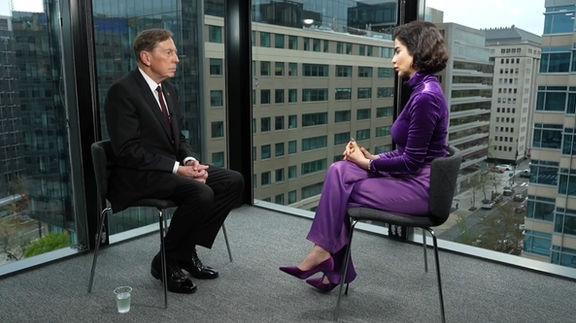
"This is not just a surgical attack on discrete nuclear capabilities. This is against the retaliatory capabilities, against the defense capability, and that's what has to be done if you're going to carry out this operation."
Plan to destroy Iran's nuclear program
Petraeus said he actually developed the plan to destroy Iran's nuclear program over 15 years ago when he was the commander of the US Central Command.
"It's publicly known that we actually rehearsed that plan one time inside the United States, with all the planes flying all the distances that they would have to fly, the refuelers, all the command and control, the jammers that drop, the munitions that we would drop, and so forth. And it all worked."

"We were prepared one time actually, to set the theater, in other words, to identify all the locations from which the planes would fly, where they would be based. The munitions were in place, the food, fuel, water, etc. All was set. We thought there was a likelihood of this. We told the White House we probably should get more prepared than we were."
'Israel proved it's possible'
Petraeus said Iran currently "does have more effective, more elaborate air and ballistic missile defenses" than in the past. However, he said, "Israel penetrated them twice, showing that that can be done."
Last October, Israeli air strikes against Iran's military sites knocked out the country's last three Russian-provided S-300 air defense missile systems, leaving the country "naked", Fox News reported citing US and Israeli officials.
The surface-to-air S-300s were the last in the Islamic Republic's arsenal after one was destroyed in an attack in April 2024 also likely carried out by Israel, Fox News quoted a senior US official as saying.
Still, Petraeus says Iran has "more retaliatory capability in terms of missiles and so forth, even though Israel dramatically reduced the ability of Iran to make solid fuel rocket engines from several per day to one or two per week."
Bunker busters
The former CENTCOM commander said the US military has bombs like the 30,000-pound GBU-57, aka Massive Ordnance Penetrator (MOP), that "is very accurate and can penetrate very hardened targets".
"It would be used against the most deeply buried hardened targets... you can imagine which target that might be," he said, adding that the use of such bunker busters is "not just possible but would be necessary" in a potential strike against Iran.
Iran’s most secretive nuclear facility, known as Fordow, has been carved deep into a mountain in central Iran, and is reportedly some 90 meters (295 feet) deep. It is also protected by several feet of reinforced concrete.
In 2012, defense experts contacted by Reuters believed the chances of a US strike against Fordow succeeding are slim. However, Petraeus says, "they can do enormous damage and destruction".
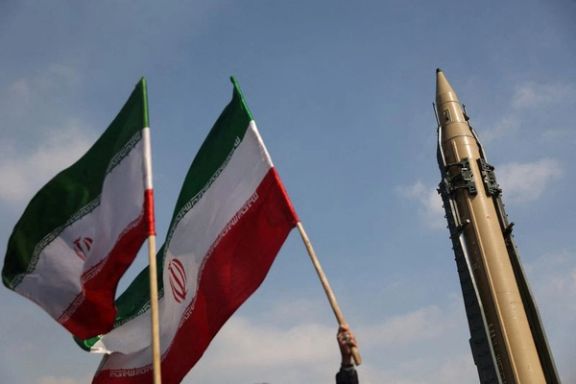
Under the shadow of US President Donald Trump’s threats to bomb Iran and after over a year of punishing blows at the hands of Israel, a bruised Islamic Republic remains defiant and seeks a comeback.
“Iran is not giving up,” Dr. Eric Mandel, founder of the Middle East Political Information Network (MEPIN) told Eye for Iran. “Iran's proxies—they may be down—Hezbollah, Hamas, the Houthis—but they’re not stopping.”
As the US positions aircraft in the Indian Ocean capable of striking Iran’s nuclear facilities, some Iranian officials have warned it will be forced to develop a nuclear weapon.
Iran has stepped up its production of fissile material in recent years, and the UN nuclear watchdog says it could accumulate enough enriched uranium for a nuclear weapon in less than a week.
Ali Larijani, a senior adviser to Supreme Leader Ayatollah Ali Khamenei, delivered this message on Monday. “If the US or Israel bomb Iran under the nuclear pretext, Iran will be compelled to move toward producing an atomic bomb,” he said.
Mandel, who regularly briefs members of Congress and national security officials, argued that supporting the Iranian people must become a central pillar of US foreign policy.
“America needs to start saying, we are pro-Iranian, pro-Iranian people, and that it becomes American policy that we want, without boots on the ground, regime change.”
In Congress, the bipartisan bill the Maximum Support Act aims at bolstering dissidents within Iran.
Developed with input from the Foundation for Defense of Democracies (FDD) and the National Union for Democracy in Iran (NUFDI), the draft legislation envisions funding opposition groups in Iran.
“I'm ashamed as an American who talks about American national security interests that we were not in 2022 standing strong with the protests,” said Mandel.
In that year the nationwide protest movement dubbed Woman, Life, Freedom was sparked by the death in morality police custody of Mahsa Jina Amini, a young woman.
'Window of opportunity'
“There is a closing window of opportunity to strike Iran, which is particularly vulnerable because of the successful Israeli attacks against their defensive anti-missile array," Mandel said, who also advocates a US strike on vital Iranian economic infrastructure.
"There is also a decreasing window of opportunity for negotiations even if
the Iranians believe there is a credible military threat."
A potential ceasefire between Russia and Ukraine could allow Moscow to deliver advanced weapons systems to Iran. That includes the S-400 air defense system—an upgrade from the S-300 system Israel disabled in an Oct. 26 strike in response to Iran’s October 2 missile barrage on Israel.
Putting the Iranian S-300s out of action opens the door to Israeli or American strikes, possibly on a larger scale. But Iran could rebuild with Russian help.
“Those missile defenses will not be down for much longer,” said Mandel, “not only for S-400s and even more evolved system, but for the SU-35 jets that the Russians have promised. And again, the Russians owe the Iranians because they've been very helpful to them during their Ukraine war.”
Moscow has publicly tried to dissuade Trump from bombing Iran’s nuclear facilities, warning of “catastrophic consequences.”